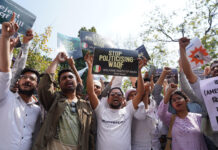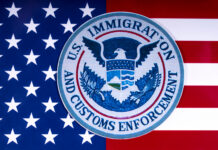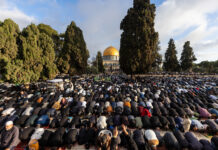President Donald Trump’s advisers are debating an order intended to designate the Muslim Brotherhood and Iran’s Revolutionary Guards as foreign terrorist organisations.
The New York Times reports that some advisers to Trump have viewed the Brotherhood for years as a radical faction secretly infiltrating the United States to promote Shariah law. And they view Iran as one of the United States’ primary enemies.
Officially designating the Brotherhood as a terrorist organisation would likely have huge consequences for American relations in the Middle East.
Founded in 1928 in Egypt, the Brotherhood’s goal was to create an Islamic society but officially renounced violence in the 1970s and embraced democracy as its means.
In recent years, offshoots have joined the political system, including Ennahda, a party that belongs to the governing coalition in Tunisia. Even in Turkey, President Recep Tayyip Erdogan’s Justice and Development Party has long supported the Muslim Brotherhood.
The Brotherhood’s most successful period ended in 2013, when President Mohamed Morsi of Egypt, who had succeeded Hosni Mubarak was removed by the military. The general who took over, President Abdel Fattah el-Sisi, has cracked down on the Brotherhood and lobbied the United States to designate it as a terrorist organisation.

The Iran part of the plan has strong support within the White House, but momentum behind the Muslim Brotherhood proposal seems to have slowed in recent days amid objections from the State Department and the National Security Council, who argue that there is no legal basis for it and that it could alienate allies in the region.
Subscribe to our newsletter and stay updated on the latest news and updates from around the Muslim world!
The Iranian Revolutionary Guards is a branch of Iran’s Armed Forces, founded after the Iranian Revolution. Whereas the regular military defends Iran’s borders and maintains internal order, according to the Iranian constitution, the Revolutionary Guards are intended to protect the country’s Islamic system. The Revolutionary Guards state that their role in protecting the Islamic system is preventing foreign interference as well as coups by the military or “deviant movements.”
The Revolutionary Guards have roughly 125,000 military personnel including ground, aerospace and naval forces. Its naval forces are now the primary forces tasked with operational control of the Persian Gulf. It also controls the paramilitary Basij militia which has about 90,000 active personnel.
Former officials said that they had been told the order would be signed on Monday, but that it had now been put off at least until next week.
The delay may reflect a broader desire by the White House to take more time with executive actions after the chaos associated with hastily issued orders, like the temporary ban on visitors from seven predominantly Muslim countries.
Critics said they feared that Mr. Trump’s team wanted to create a legal justification to crack down on Muslim charities, mosques and other groups in the United States. A terrorist designation would freeze assets, block visas and ban financial interactions.
Among those objecting is the Council on American-Islamic Relations, which describes itself as the largest Muslim civil rights organisation in the United States.
“We believe it is just a smoke screen for a witch hunt targeting the civil rights of American Muslims,” said Ibrahim Hooper, a spokesman for the council. He said that, given what he called false attempts to link Muslim Americans to the Brotherhood, a terrorist designation would “inevitably be used in a political campaign to attack those same groups and individuals, to marginalize the American Muslim community and to demonize Islam.”






















